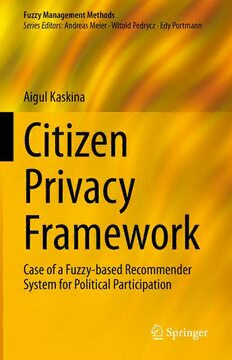
Citizen Privacy Framework: Case of a Fuzzy-based Recommender System for Political Participation PDF
Preview Citizen Privacy Framework: Case of a Fuzzy-based Recommender System for Political Participation
Fuzzy Management Methods Series Editors: Andreas Meier · Witold Pedrycz · Edy Portmann Aigul Kaskina Citizen Privacy Framework Case of a Fuzzy-based Recommender System for Political Participation Fuzzy Management Methods SeriesEditors AndreasMeier,Fribourg,Switzerland WitoldPedrycz,Edmonton,Canada EdyPortmann,Bern,Switzerland With today’sinformationoverload,it hasbecomeincreasinglydifficultto analyze the huge amounts of data and to generate appropriate management decisions. Furthermore, the data are often imprecise and will include both quantitative and qualitative elements. For these reasons it is important to extend traditional decision making processes by adding intuitive reasoning, human subjectivity and imprecision.To dealwithuncertainty,vagueness,andimprecision,LotfiA.Zadeh introduced fuzzy sets and fuzzy logic. In this book series “Fuzzy Management Methods” fuzzy logic is applied to extend portfolio analysis, scoring methods, customer relationship management, performance measurement, web reputation, web analytics and controlling, community marketing and other business domains to improvemanagerialdecisions. Thus, fuzzy logic can be seen as a management methodwhereappropriateconcepts,softwaretoolsandlanguagesbuildapowerful instrumentforanalyzingandcontrollingthebusiness. Aigul Kaskina Citizen Privacy Framework Case of a Fuzzy-based Recommender System for Political Participation AigulKaskina DepartmentofInformatics UniversityofFribourg Fribourg,Switzerland ISSN2196-4130 ISSN2196-4149 (electronic) FuzzyManagementMethods ISBN978-3-031-06020-5 ISBN978-3-031-06021-2 (eBook) https://doi.org/10.1007/978-3-031-06021-2 ©TheEditor(s)(ifapplicable)andTheAuthor(s),underexclusivelicensetoSpringerNatureSwitzerland AG2022 Thisworkissubjecttocopyright.AllrightsaresolelyandexclusivelylicensedbythePublisher,whether thewhole orpart ofthematerial isconcerned, specifically therights oftranslation, reprinting, reuse ofillustrations, recitation, broadcasting, reproductiononmicrofilmsorinanyotherphysicalway,and transmissionorinformationstorageandretrieval,electronicadaptation,computersoftware,orbysimilar ordissimilarmethodologynowknownorhereafterdeveloped. Theuseofgeneraldescriptivenames,registerednames,trademarks,servicemarks,etc.inthispublication doesnotimply,evenintheabsenceofaspecificstatement,thatsuchnamesareexemptfromtherelevant protectivelawsandregulationsandthereforefreeforgeneraluse. Thepublisher,theauthorsandtheeditorsaresafetoassumethattheadviceandinformationinthisbook arebelievedtobetrueandaccurateatthedateofpublication.Neitherthepublishernortheauthorsor theeditorsgiveawarranty,expressedorimplied,withrespecttothematerialcontainedhereinorforany errorsoromissionsthatmayhavebeenmade.Thepublisherremainsneutralwithregardtojurisdictional claimsinpublishedmapsandinstitutionalaffiliations. ThisSpringerimprintispublishedbytheregisteredcompanySpringerNatureSwitzerlandAG Theregisteredcompanyaddressis:Gewerbestrasse11,6330Cham,Switzerland To myparentsandAndreasMeier in recognitionof theirsupport. Foreword Privacyhasbecomeanincreasinglyrelevanttopicinthefieldofsocialinformation systems, and particularly in the field of eDemocracy, where applications increas- ingly gather tremendousamountsof user data as input to the democratic process, for political discussion, or for recommendation purposes. This data may pose a severethreattouserprivacy,forexample,ifaccessedbyuntrustedparties,orused inappropriately.Inessence,usersofthesesystemsfaceavexingtradeoff:disclosing theirinformationwouldincreasetheir abilitytoparticipateinthe onlinediscourse that these systems enable, but privacyconcernsurge them to refrain from sharing morethananominalamountofinformationwiththesesystems. Aspeoplevarysubstantiallywithregardtohowtheyvaluethistradeoff,privacy advocates suggest giving users an informed choice regarding the disclosure and use of their personalinformation.Unfortunately,the privacyimplications of most modern information systems are so complex that even the most motivated users are unable to take effective control over their privacy settings without reaching thelimits oftheircognitiveabilities. To overcomethese problems,researchersare increasinglyfocusingon user-tailoredprivacy asa meansto providepersonalized privacydecisionsupport.Broadlyspeaking,user-tailoredprivacyfirstcreatesauser modelbasedonacontextualizedunderstandingofusers’privacybehaviorsandthen uses this model to adapt the default privacy settings, privacynotices, the privacy- setting interface, and/or the personalization mechanism to each individual user’s preferences. The academic understanding of user models for privacy has evolved from unidimensional to multidimensional to profile-based models. In most systems, however, the privacy preferences of users are complex and varied to an extent that they cannot be captured in a small discrete set of profiles. This is the central observation upon which Dr. Aigul Kaskina based her thesis A Fuzzy-Based User Privacy Framework and Recommender System: Case of a Platform for Political Participation,whichispublishedinthisbookandforwhichshereceivedherPhD in 2018 from the Faculty of Science at the Universityof Fribourgin Switzerland. Dr. Kaskina’s work proposes fuzzy clustering as a much-needed solution to this problem, since it serves as a compromise between the simplicity and elegance of vii viii Foreword simple profiles and the advanced ability to capture each individual user’s privacy preferencesofrecommendationapproachessuchascollaborativefiltering. While the broader goal of this book is to develop a conceptual framework thatenhancescitizens’ privacyin eDemocracyby generatingpersonalizedprivacy recommendations,itcanprimarilybecommendedforitsdirect,real-lifeapplication of user-tailored privacy in ParticipaIntelligente, an online political participation platform in Ecuador. Although political discourse is more fruitful in audience- restricted environments, the user study presented in this book finds substantial amount of variation in the privacy settings of 391 users of this application. In fact, many of these users do not restrict the visibility of their contributions and interactions on the platform, most likely because of a lack of knowledge and/or engagement. To help these users, Dr. Kaskina implements a fuzzy-based privacy recommender, which analyzes the user’s current privacy settings and provides a recommendationfor“better”settings.Effectively,thissystemleveragestheefforts of users who possess sufficient knowledge and motivation to spend effort to set their privacy settings to provide personalized recommendations to users who do not possess such knowledge or motivation. The accuracy of multiple clustering methodsandclustergranularitiesisconsidered,andthebookculminatesinauser- centriccomparisonof“sharp”(onaveragemuchdifferentfromusers’ownsettings) and“soft”(nottoodifferentfromusers’ownprofiles)recommendationapproaches againstusers’manuallyselectedsettings.Particularly,the“soft”recommendations resultinlowerreactancebutalsoasomewhatloweroutcomesatisfaction,whilethe “sharp”recommendationsscoreequaltousers’ownsettingsonoutcomesatisfaction butperformworseonallothermetrics. Toconclude,thisbookcontainstrailblazingworkintheuseoffuzzyclustering forprivacypreferenceprediction.Istronglyrecommendthisbooktousermodeling researchers interested in a practical application of fuzzy clustering, to privacy researchers interested in the state of the art in privacy modeling, and to system designers and service providers in eDemocracy who want to learn about ways to buildsystemsthatrespecttheprivacyoftheirusers. SchoolofComputing Dr.BartP.Knijnenburg ClemsonUniversity UnitedStatesofAmerica Acknowledgments egocurious,ergosum.jesuiscurieux,doncjesuis I would like to acknowledge the immense support from my supervisor, Prof Dr Andreas Meier, who helped make this thesis feasible. Thank you, Andreas, for supporting me in developing my capabilities as an independent researcher. This work was another step on the way of discovering and finding myself. I was also surrounded with the continuous support and mentoring from my dear colleagues Luis Teran, Marcel Wehrle, Alexander Denzler, Dac Hoa and others, for which I am extremely grateful. Your valuable advice encouraged me to move further. A specialthankyougoestoLuisTeranandMarcelWehrlefortheirtechnicalsupport duringtheresearchproject.AvaluableengagementfromBartKnijnenburgandEdy Portmann profoundlycontributed to the accomplishmentof the thesis. Your great expertiseandscientificenthusiasmwasincrediblyinspiringandshapedmyresearch mind.Thankyouforyoursupportandinsightfulcollaboration.Itwasalsoapleasure to collaborate with outstanding students Nevena Radovanovic, Sonia Parani and Luka Hamza. Thank you for working on common projects where I have learned new things since working with you. To Sylviane Pilloud and Elisabeth Brügger,I giveasincerethankyouforhelpingmeduringmystayandtheteachingactivitiesat the University of Fribourg. I am glad to have met my friends with whom I have enjoyed these 4 years of research, in particular, Lorena Recalde, Ximena Jativa Sierra,MarcoSchneiter,LizaZimmerman,MelanieBoninsegni,MinhTueNguyen, RezaGhaiumyAnarakyandotherdearfriendsfromallovertheworld.Finally,an endlessgratitudeandlovetomyparentsforbringingmeintothisbeautifulworld. ix Contents 1 Introduction .................................................................. 1 1.1 Motivation .............................................................. 1 1.2 Objectives............................................................... 2 1.3 ResearchQuestions..................................................... 2 1.4 ResearchMethods...................................................... 3 1.5 ThesisOutline .......................................................... 5 1.6 OwnResearchContribution ........................................... 6 References..................................................................... 7 2 InsightsintoPrivacyResearch ............................................. 9 2.1 EconomicsofPrivacy—aRationalHuman ........................... 9 2.1.1 PrivacyCalculus................................................ 9 2.1.2 DeathtoPrivacyCalculus?.................................... 10 2.1.3 PrivacyParadox................................................ 11 2.2 BeyondRationality—HumanCognition .............................. 13 2.2.1 CognitiveHeuristicsBehindDisclosureDecisions........... 13 2.2.2 EnforcedbyIndividualCharacteristics? ...................... 14 2.3 AutomatingUserPrivacySupport..................................... 15 References..................................................................... 17 3 CitizenPrivacyProfileFramework........................................ 21 3.1 ConceptualDevelopment .............................................. 21 3.1.1 OverviewofExistingPrivacyFrameworks................... 21 3.1.2 CitizenPrivacyProfile(CPP)Framework .................... 24 3.1.3 EvaluationofCPPFramework ................................ 29 3.2 ImplementationofCPP ................................................ 32 3.2.1 PlatformDescription........................................... 32 3.2.2 PrivacySettingsFunctionality................................. 34 3.2.3 PrivacyProfilesExtraction..................................... 37 xi
